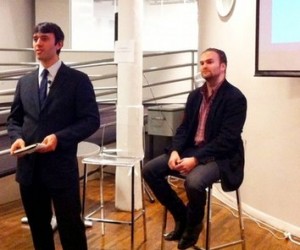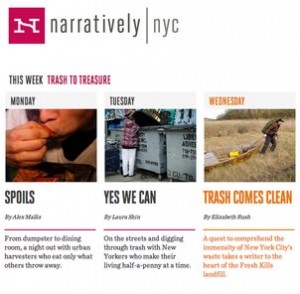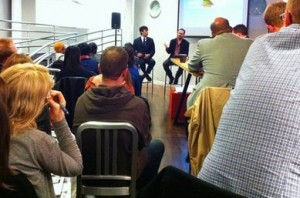Brands
Exploring Narratively’s Slow Journalism Approach
Let’s get beyond the 24-7 news cycle, says Noah Rosenberg, founder and editor-in-chief of Narratively.

Journalist Jay Dixit introduces Noah Rosenberg at Tuesday’s forum.
As a new online multimedia platform, his site aims to make a home for writers and stories that do just that — content that take weeks, months, even years to bring on board.
Launched this past September to the tune of nearly $54,000 — the money was raised on Kickstarter — the approach to Narratively’s brand of long-form online journalism is largely about getting outside of any typical corporate-media box.
Speaking to some 60 people at Content Conversations‘ Nov. 13 panel, held at the offices of Outbrain in Manhattan and co-sponsored by Contently, Rosenberg told the Narratively story. He talked about what writers, publishers — and, yes, readers — can expect from the newly fledged “slow journalism” endeavor.
Long-Form and the Web
Narratively is a website. And Rosenberg is talking about long stories on the web: 5,000–6,000 words at a time, in some cases. And also video. Audio, too.
 One form of conventional wisdom about web readers, however, is that they want everything short — 500 words or maybe 700 at a stretch — and that they want it of-the-moment. An hour ago equals old news.
One form of conventional wisdom about web readers, however, is that they want everything short — 500 words or maybe 700 at a stretch — and that they want it of-the-moment. An hour ago equals old news.
But Narratively strikes out on a different path, and its content may be striking at just the right time.
“There has been a pretty big pushback when it comes to that whole 24-7 echo chamber that the web often becomes,” he said. “Brainpicker, you might have heard about. Longform.org. Longreads. The reason these curators have sprung up is that there’s so much out there, and people are really hungry for these morsels of thoughtful, interesting content.
“You know there’s a push in a certain direction,” Rosenberg continued, “when even outlets like BuzzFeed, which made a lot of money doing viral-ready short little top-20 lists are now hiring a long-form editor to get into that game as well.”
The Economics of Long-Form
Still, Rosenberg’s foray into the long-form game is tempered by one reality. The Kickstarter campaign is only the beginning when it comes to attracting talent to his endeavor, and it is far from the end of his financing push.
“The elephant in the room is that in-depth, long-form content takes time and it takes a lot of money,” he said. “I’d be lying to you right now if I said I thought we were paying people what I thought they deserved.”
Narratively’s initial dose of support has fueled honorariums for what Rosenberg said are some 90–100 contributors. He and his team currently work with a stable of writers — many 24–34 years old, he said — who have, in many cases, made their freelance careers viable via older, traditional outlets such as the New York Times and the New Yorker.
Those are the kind of bylines that Rosenberg said he wanted on the site. And so, presumably, many of those writers aren’t bringing their words to Narratively for the cash, at least not for a lot of it. Rosenberg suggested it was another reason: they want certain stories to be told.
Getting Dirty: The Narratively Kind of Tale
Rosenberg described Narratively’s writers as often coming to the site with a piece of work in near flight-ready form. A story conceived, reported, and written, but one that has yet to find a home. It may not be entirely commercial. It is somehow a little bit farther from the beaten path.
 In some ways, that is Rosenberg’s story as well, and it is the story of Narratively’s birth.
In some ways, that is Rosenberg’s story as well, and it is the story of Narratively’s birth.
“I always had a passion for storytelling, and for telling stories in different ways,” he said. “When I first moved to New York, in 2005, I found myself working for CBS news, climbing that corporate ladder. I was kind of depressed, because I was doing post-production and I’m a journalist. I wanted to be out there getting dirty.”
And so he started writing.
Rosenberg said he’d take a train to the far-flung edges of the city. He dive into the water with Coney Island swimmers on New Years Day. He’d collect the details of boroughs that he considered the “untold, under-covered morsels of human interest, the ones that the local newspapers didn’t gravitate toward — those are what I wanted to do with my career.”
Rosenberg suspects that there are more journalists like him, out there, writers and filmmakers and documentarians of all kinds who’ve had similar experiences. He’s banking on the chances that they’ll hear his, and Narratively’s, call.
Get better at your job right now.
Read our monthly newsletter to master content marketing. It’s made for marketers, creators, and everyone in between.




